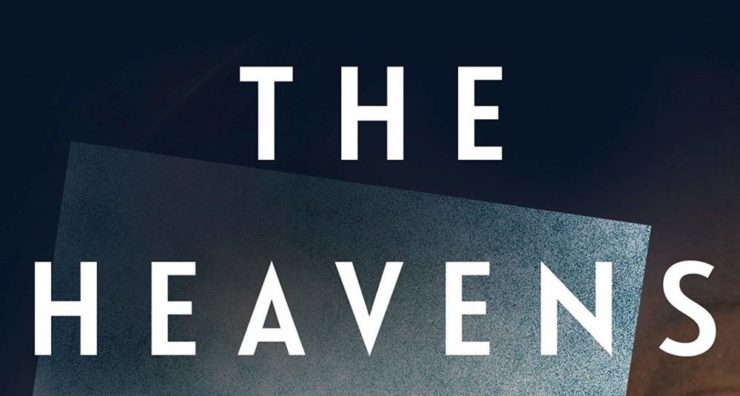How rare and wonderful it is to find a book that surpasses already high expectations. Sandra Newman’s The Heavens is one such title. It’s a fantasy about reality and it’s one of the best new novels I’ve read in ages.
Where did my high hopes come from? First, Newman’s previous novel, The Country of Ice Cream Star, a post-apocalyptic epic apparently far less sweet than its title suggests, was a critical favorite said to bear comparison with Riddley Walker. Second, Newman’s Twitter feed is a marvel of casual surrealism, trenchant commentary, and memorable remarks; entire books I’ve known possess less originality than one of her tweets. Finally, I’d heard editors on both sides of the Atlantic sing its praises months before publication. I worried it wouldn’t live up to the praise I’d already heard; within twenty pages, my doubts evaporated.
The Heavens is the story of two people and several worlds. The two people are Kate and Ben, who meet on an enchanted night at a bohemian party on East 86th Street in the blessed year 2000, when the future looks as bright as the lights of New York. The several worlds are the problem. All her life, Kate has dreamed of another existence in another time and place; shortly after she meets Ben, these dreams begin to change reality. Ben is constant, but every time Kate wakes up, her world has a different, and worse history.
I don’t think I could spoil The Heavens if I tried, but this review will, of necessity, give away a few effects and, perhaps, rob the reader of a frisson or two. So if by some chance I’ve already convinced you to read this book, please don’t continue with the review.
Kate’s dreams take her into the life of Emilia Lanier, one of those historical figures with lives so remarkable that few novelists would be afraid to invent them. Kate-as-Emilia has visions of an apocalypse, a ruined city of “cinders and ice” atop “the broken planet venting its innards in smoke” surrounded by “the husks of dead beetles that had gathered in drifts.” As distressing as these visions are, Kate believes that she’s been chosen to avert this calamity, that her dreams might grant “the key to the salvation of the world.” And so Kate-as-Emilia begins to act; she’s drawn in particular to one obscure man, who somehow seems the only other “real” person in Elizabethan England.
Each time Kate awakes, it’s to a different, and worse, world. When Ben and Kate first meet, 2000 marked was the year that “Chen swept the presidential primaries on a wave of utopian fervor, when carbon emissions radically declined and the Jerusalem peace accords had been signed and the United Nations surpassed its millennium goals for eradicating poverty.” Things deteriorate whenever Kate returns from the sixteenth century: Parents separate or die, friends lose their money or their minds, siblings vanish, neighborhoods disappear, New York gets dirtier and the world grows uglier. There’s one positive development, yet it’s not of the catastrophe-averting variety, and Kate begins to wonder if she has misunderstood the purpose of her nightly trips. Ben tries to help his girlfriend, but he doesn’t remember any past lives and quite naturally assumes Kate to be mad. As reality cracks, so does their relationship.
Buy the Book


The Heavens
The first days of Ben and Kate’s courtship are dreamlike in their happiness; the later days are heartbreaking. Newman writes happy and sad equally well, and her plot never overwhelms its characters. We eventually learn something of the reason for Kate’s ordeal, yet it’s the emotional truth, not the whys and wherefores, that matters. Were they plucked from The Heavens and plopped down in an entirely realistic novel, Ben, Kate, and their friends would all remain captivating.
I’m glad that Newman decided against writing a realistic novel, because her imaginative range staggers. How many writers can convincingly recreate the England of Elizabeth I and imagine a whole series of variant New Yorks? Ben and Kate move through at least a dozen realities over the 250-odd pages of The Heavens, but Newman is a deft worlds-builder, permitting readers to infer whole new realities from a single line of dialogue or a passing detail. Though I cannot vouch for New York’s mood in the first days of the Chen administration, Ben and Kate’s New York milieu always convinces, and I appreciated the unforced diversity of their semi-bohemian life: I’m not sure there’s a single straight white male in the contemporary segments of the story, though I didn’t realize this until I’d turned the last page.
The Heavens has a happy beginning, a sad middle, and a bittersweet end: Love may be the best of us and love may endure, but it can’t conquer all and we shouldn’t expect it to. Though Emilia’s England might look like a fairy tale, its glamour hides fatal cruelty. Before her dreams turn nightmarish, Kate reflects that “the dream was just what had happened to her. It was one of those things where the best you could do was to hide it from other people.” The Heavens is not like Kate’s dream; I will be telling everyone I know about this novel.
The Heavens is available from Grove Atlantic.
Matt Keeley reads too much and watches too many movies. You can find him on Twitter at @mattkeeley.










